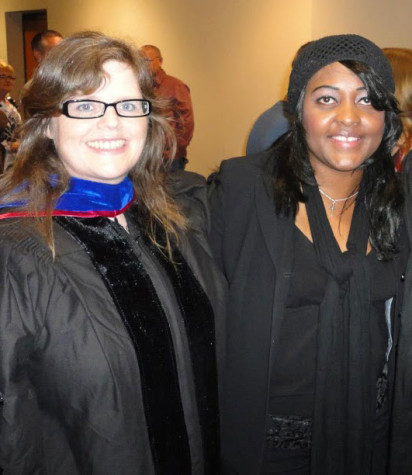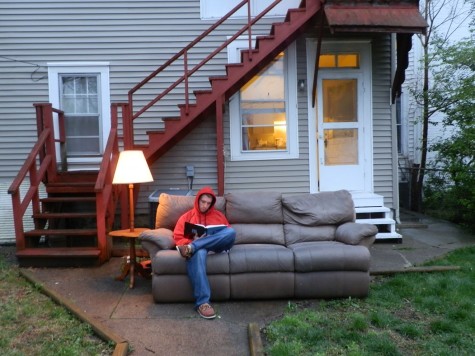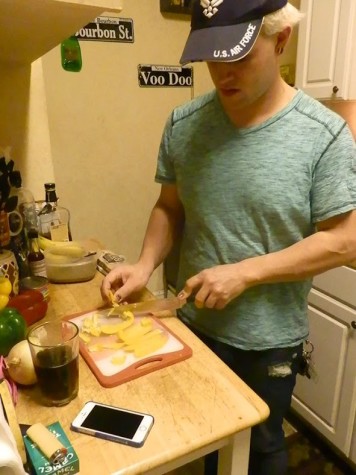The Other Side of Homelessness
Homeless college students are often an overlooked demographic that face unique challenges in accessing higher education
April 13, 2015
Victoria Bennett had a plan.
In 2010, realizing that she needed to follow her dream of graduating with an IU degree, Bennett, then a political science student at Kennesaw State University near Atlanta, sold her house, gathered up her savings and prepared to move.
“One day I realized I’ve got an empty nest, my kids are grown, they’re off on their own, and I said ‘well, I’m going to go back home,’” she said. “’I’m going to go back to Indiana and get the degree I want.’”
She had a house in a good neighborhood, a brand new car and 20 years of experience as a paralegal. She was, by many estimations, a responsible adult with a good cushion to help with the transition.
But just a year-and-a-half after moving, Bennett, still in school, found herself without a home or a permanent job.
“The first thing people think is, ‘Well what’d you do to get yourself in that spot,’” she said. “And I’m thinking to myself, ‘Absolutely nothing.’ I’ve lived probably the quietest life you’ll ever see. I don’t drink — I never have. I don’t smoke, I don’t do drugs — I don’t have any of those issues or those vices. And I find myself saying ‘well gee, I don’t even have a roof over my head.’ It was just baffling.”
Although most people conjure the image of soup kitchens and “will work for food” signs when they think of homelessness, Bennett was in a situation like many others across the country who experience some housing insecurity while enrolled in college.

faculty mentor Jean Abshire.
It’s hard to quantify the extent of the problem. The Free Application for Federal Student Aid (FAFSA) asks students to indicate if they’ve experienced homelessness recently. In the 2012-2013 school year, more than 58,000 homeless students applied for aid.
But that figure is very likely underestimated, say organizations like the National Association for the Education of Homeless Children and Youth. First, the figure only includes those who are applying for federal financial aid, leaving out those who might not realize there is aid available. It also misses students who might not realize they are homeless, such as those who live in their cars or “couch-surf” among friends’ homes.
Melissa Fry, director of the Applied Research and Education Center at IU Southeast and assistant professor of sociology, was part of a team that completed a research project in 2014 focused on homelessness and poverty in Southern Indiana. She said it is very difficult to accurately count those in the community who may be homeless. Some populations, she said, don’t get counted.
“People who are couch surfing or doubling up with somebody else temporarily, they don’t get counted,” she said. “Or if you just don’t get found. And certainly people refuse to participate and don’t get counted.”
Advocacy organizations point to issues such as rising higher education and housing costs and a tough economy as reasons for increases in student homelessness. Sometimes events like a job loss can push students over the edge. That’s what happened to Bennett.
The Bottom Falling Out
In the summer of 2010, before moving to start at IU Southeast, Bennett had secured an apartment in the east end of Louisville and a job at a law firm downtown. She had chosen an adviser and asked about the best ways for her to succeed so when she started at IU Southeast in spring 2011. She was ready to go.
That first year, she worked full-time at the law firm, had a full course load at school and with a very active life on campus — she was in the Honors Program and co-chair of the Honors Program Student Advisory Board, a member of the Student Government Association, vice president for the College Democrats and volunteered through Campus Life.
Things seemed to be on the right track, until spring 2012.
“And that’s when the bottom fell out,” Bennett said.
Bennett’s employer had been flexible with her work schedule, working around classes. During one semester, they allowed her to leave for a class during the day and return to work afterward. She would then return to New Albany for the rest of her classes in the evening.
“I did that all semester,” she said. “It was tough, but I did it.”
But the flexibility didn’t last. She was forced to choose work or school.
“They just kind of put my back against the wall and said, ‘You either can come here or you can go to class, but you can’t do both,’” she said. “I was put in a very difficult situation.”
Bennett said she chose to stay in school because she had been in school for four years at that point, including the time spent in Georgia, and her goal of finishing with an IU degree was what brought her there in the first place.
Although Bennett had grants, scholarships and loans to help cover the cost of attending IU Southeast, she was unable to find another job quickly. By February of 2012, she had lost her apartment.
Bennett said during this time, she applied for public assistance and was turned down.
“I couldn’t get health coverage, I couldn’t get public assistance, and I couldn’t get unemployment,” she said. “They just kept telling me I didn’t qualify for anything. And the problem was they were looking at my income (from the previous year), and by their measures, I was not in need. They could see my income from Georgia and that was, you know, laughable that they’d think I’d even be asking for anything making that kind of money that I had been making.”
Without a permanent place to live, Bennett said she stayed with several different friends over the next six months and, for a time, in a hotel. Sometimes she stayed at school.
Eventually she opened up to someone on campus she had great trust in — Jean Abshire, associate professor of political science and Bennett’s adviser. Abshire worked with others at IU Southeast to secure her one of the few single rooms in one of the lodges on campus. She paid the full rent and stayed there until she graduated in 2013.
“Before I got the housing on campus, there were a few nights I can recall just saying ‘I’m just going to stay in my car’ because who was I going to tell? Who was I going to say something to? It was difficult, scary — it was unnerving,” Bennett said. “So getting the housing on campus was just a godsend.”
Abshire said unfortunately, the series of events that led to Bennett’s struggle is common for not only college students but also for many Americans.
“It can be a very slippery slope,” she said. “You can be humming along OK, not great but managing just fine, and then one unanticipated event can just lead someone into a total death spiral.”
Helping students in need
Abshire said although in theory the resources are there to help those in need, they may be hard to find or difficult to navigate.
Abshire said her knowledge of Bennett’s and other students’ struggles finally led her to go to the campus administration, and she helped get the ball rolling on hiring a staff counselor/care manager on campus to help with these issues.
Karen Richie, a licensed clinical social worker, started in that position in January. She said she is working with others on campus to determine the greatest area of need for students.
“There was a gap in services for people who did struggle with housing instability, food instability, medical issues and struggling through college because they didn’t sleep well last night or they didn’t have any food to eat for three days,” she said.
She said students are referred to her through many channels — some through financial aid, some who have called the chancellor’s office seeking help, some through professors whom they have confided in.
“Were still trying to find out the greatest need on campus and how we can bridge that need,” she said. “We can’t put everyone into housing for free. We understand that. We can’t feed everyone for free. But we might be able to find some support to get you into housing at a lower cost or through the approval application that goes through a different department. We might be able to find some food or shelters in the area, or we might be able to locate food that people have on hand here.”
Richie said she might have a scheduled therapy session with someone and find out the reason they’re in therapy might be related to other stressors, such as housing insecurity or financial struggles.
“So we kind of we go through Maslow’s Hierarchy — when you go all the way back to the bottom it goes security, safety and basic needs are the priority,” she said. “So I can’t do a lot of therapy on somebody who’s hungry. I can’t do a lot of therapy on somebody who’s actively using substances. That’s a struggle. So we have to take it back a notch and go let’s kind of problem-solve around this area. And so we put everything else on hold and said let’s see who we can call and what we can do.”
“We look for the medical piece of it, the clinics and how that piece would go,” she said. “If the vehicle is your mode, let’s see if we can get you some gas money.”
She said there are organizations that can help with medical, housing, or transportation needs, for example.
“The community is out there,” she said. “And there are lots of services and support available, and they’re willing to give information if you’re stuck. But a lot of times, we don’t know where to start. So that’s become my job.”
Finding help with financial aid
For some students who find themselves in tough situations, federal aid might help to cover some of the costs of higher education. The amount of aid available to students in determined by a set of factors based on information entered yearly into the FAFSA.
One particular problem some students may face, however, is the difficulty in proving oneself to be an “independent student” on the FAFSA, which may or may not result in more opportunities for federal aid, including loans.
This status means that the student does not have to report parental information on the FAFSA and is usually based on the student turning 24, although there are a number of other factors — such as veteran status — that would determine dependency status, Rachel Kynhoff, IU Southeast financial aid counselor, said.
Bryan Jones, journalism senior, just turned 24 at the end of the fall 2014 semester. He said this was the first semester he has been considered independent, even though, he said, he has not lived with either of his parents since he was 18 and does not rely on them financially.

“I thought I should have been considered an independent student [before that],” Jones said. “If I’m not relying on my parents’ income, then why am I considered dependent?”
Jones said he has moved eight times since moving out of his mother’s house — sometimes staying with friends or family members, sometimes not having much of his own space to live in. He said sometimes, though, he must take whatever is available.
“It just depends on the place,” he said. “Sometimes I’m on couches, sometimes I’m on floor cushions.”
Traci Armes, director of financial aid at IU Southeast, said that there are many situations that can fall under different categories, but that doesn’t mean that the financial aid office can’t help students in tough situations.
She said there are questions on the FAFSA regarding homelessness, although the situations are not always clear-cut.
“We always look at the students on a student-by-student case,” she said. “And we advise our students because we’re looking out for their best interests. We don’t want to create extra barriers for students who already have barriers to get their education. We’re here to help counsel them on their individual situations and what’s best for them.”
She said that students should first visit the financial aid office before making any changes to an existing FAFSA on their own.
“If things change, we would have the student come
in and direct them on what needs to be changed on the FAFSA,” Armes said. “We would never advise the student to just go into the FAFSA and make changes on their own without talking with the financial aid office first, because that could mess up some other things.”
Jones said he was able to get additional help with school and living expenses through other financial aid. But despite being only about 22 credits away from graduating, he said he had to leave school to help care for his sister, who has cancer.
He said the stress — both with money and his family — are what led to him leaving school.
“I think I just needed a minute to kind of take it off and breathe,” he said.
Veronica Medina, assistant professor of sociology, was one of Jones’ mentors on campus. She said that situations like Jones’ can be difficult for students because worrying about schoolwork when basic needs like housing are in limbo can be very stressful.
“It’s just a tremendous amount of emotional stress, a lot of mental stress,” she said. “And I think it just takes time away from school because you’re trying to problem solve in the course of your day, like ‘What’s the next step for me.”
She said that she thinks that the campus does a good job at recognizing the additional needs IUS students may need, especially as many are first-generation college students and come from more working-class backgrounds.
“Just having that recognition that our students face greater financial struggle, and that sometimes they are torn between work and school is something that is just helpful for us as a campus to recognize,” she said. “That our students have barriers. They’re not impediments. They’re not deficiencies. But they do throw a wrench in what students’ plans are.”
Medina said she believes Jones has a lot of potential and hopes that one day, the support system he has at school will help him actualize his educational goals.
“He does have a very good support system at school,” she said. “I do really think that the faculty who care for him care for him a lot, and they want to see him succeed.”
Success with a little help
Bennett is currently working on finishing up a master’s degree at Arizona State University. After that, she said she plans to go to law school.
Looking back, Bennett said she doesn’t know how she did it, other than her drive to reach her goals.
“It was tough — I don’t know what kept pushing me,” Bennett said.
“I knew first and foremost I could not let that situation curtail or disrupt my ultimate goal of moving there in the first place and that was to obtain my degree from IU. That was all I knew. That was all I focused on. And the hard times I think probably just propelled me even more to say ‘You’ve got to keep pushing.”
“During the day, when the campus was busy and buzzing, I just got and did my thing and said ‘OK, today’s another day, just go for it.’ Somehow I could push through. But it was probably one of the hardest times in my life.”
Bennett said that help — from Abshire, Residence Life and Housing, and others — kept her afloat and on path to meet her goals.
“Dr. Abshire, every chance she gets she’s saying, ‘You’re strong, and you’re remarkable, and you’re going to get through this — you’ve done such a great job,’” Bennett said. “But sometimes when you’re in the midst of it, it’s hard to step back and see what you’ve done.”
Abshire said she didn’t have a second thought to helping Bennett.
“As a human being, I feel like I have an obligation to other human beings,” Abshire said. “But also we have a commitment to our students as a campus community and as an institution.
“Victoria was and is a fabulous student, but no student, no matter how good, is going to be able to do their best when they’re facing huge life challenges like that.”
Abshire said although she never doubted that Bennett would push through the struggles and find success, she wasn’t sure at what cost.
“She is so determined and has so much strength and so much drive and motivation and focus, I never ever doubted her, but I was concerned about what toll it might take,” Abshire said.
“But Victoria is exceptional, and in that, she was kind of a good lesson or reminder for me that you can be somebody who does absolutely everything right, and you can still get caught in a trap.”
